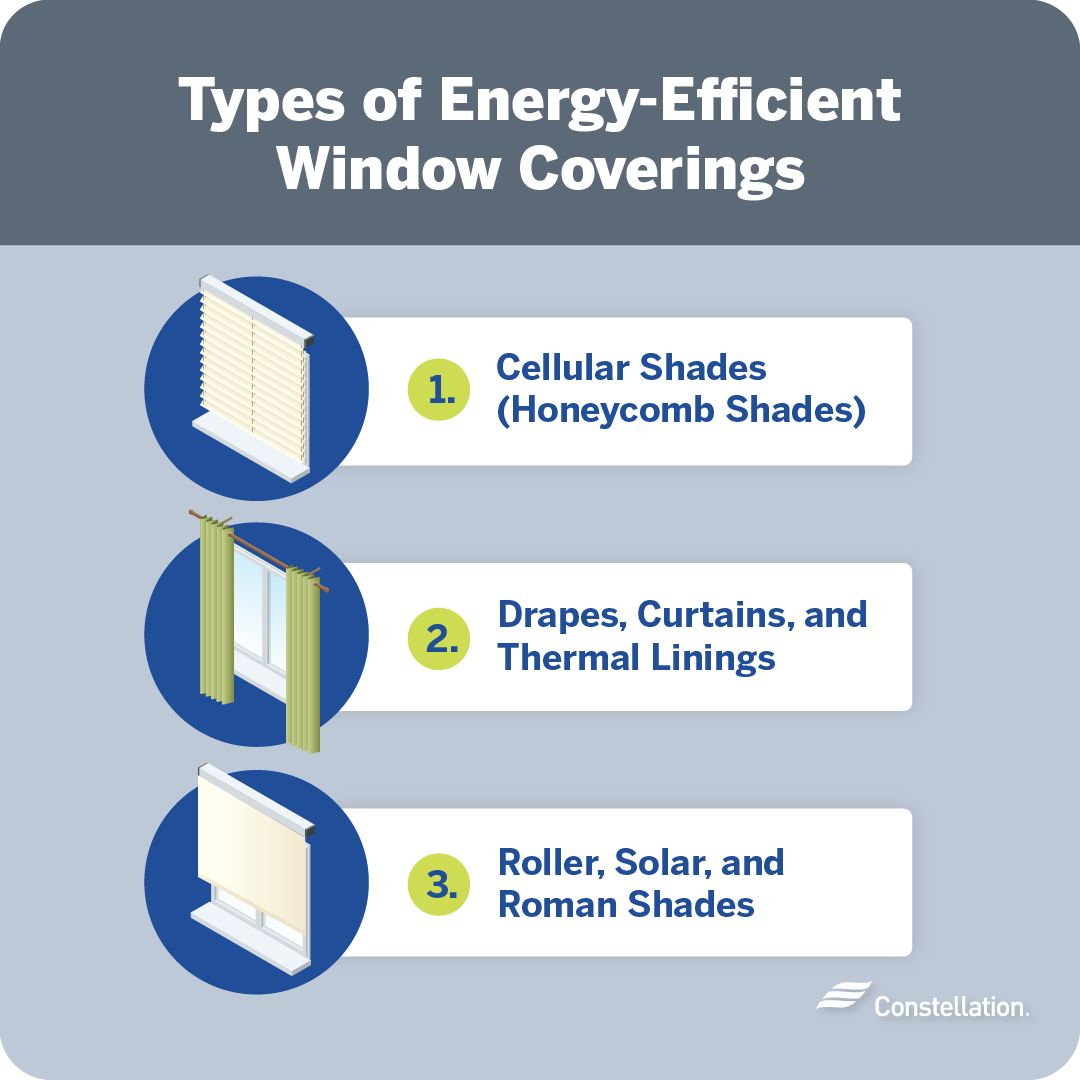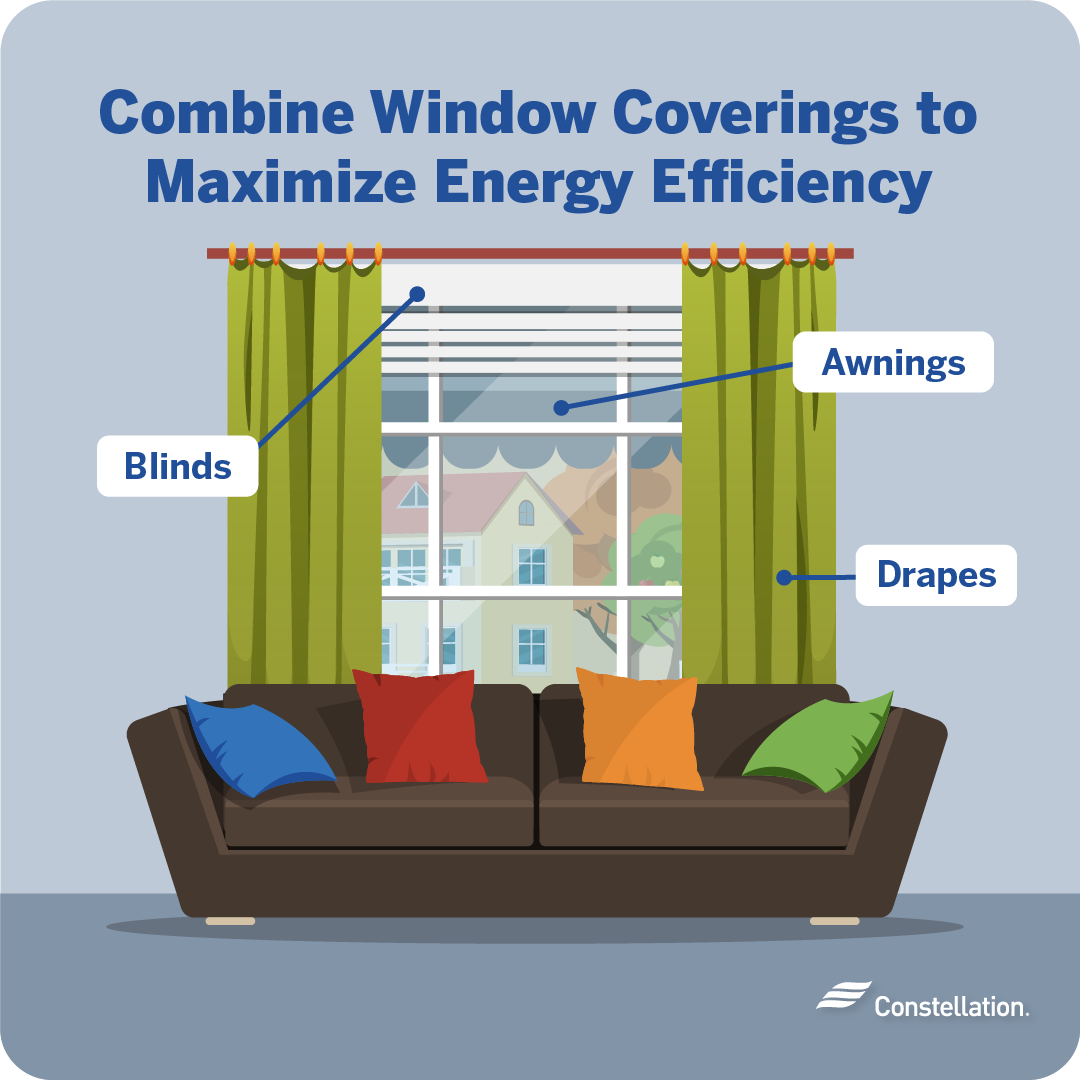
- Category:
Home Energy Savings -
Last updated:
July 12, 2023
How to Choose the Best Energy-Efficient Window Coverings for Your Home
Learning how to block sunlight heat from windows around your home may make you more comfortable on hot days and could possibly lower your energy bills. Adding energy-efficient window coverings can help improve privacy, cut glare and slow fading. With so many choices in energy-efficient window treatments, you can also enhance the beauty of your rooms.
Types of Window Coverings
Start with the benefits of energy-efficient windows. Then, when it comes to what to put on windows to keep heat out, the options are endless. Some are more energy efficient than others.
- Cellular Shades
- Drapes / Curtains
- Roller / Solar/ Roman Shades
- Thermal Shades
- Shutters
- Blinds
- Window Films
- Awnings
- Exterior Shades
- Sun Screens
How Do Window Coverings and Treatments Save Energy?
Even well-insulated windows have the potential to lose energy without the proper coverings. Managing light and heat minimizes the need for electric lights and could lower energy needed for heating and cooling. And adding window coverings is a fast, fun energy-saving project.
In the summer, when hot sunlight shines through windows, the temperature of a room can soar. Fully covering the window can nearly eliminate this heat source. Open the covering when the sun moves away from the window to let in natural light. Statistics from Energy.gov state that 75% of residential window coverings remain in the same position every day, all day, which is a mistake.
How to Block Sunlight Heat from Windows During Summer
Help maximize your home’s energy efficiency by making careful use of daylight during the summer. EPA research shows that 76% of sunlight that falls on standard double-pane windows becomes heat in your house. Blocking this heat during the day may make your home more comfortable and could help lower your power bill.
How to Insulate Windows from Energy Loss During Winter
Windows that get lots of sun should be blocked during the heat of summer days. In winter, do the opposite on cold days. Open window coverings all day in the winter to let the warmth shine in and make the best use of natural light. According to the EPA, however, 30% of the heat energy in your home bleeds out through windows. In winter, a good insulating covering on cloudy days and at night can cut down on this loss.
The Top Energy-Efficient Window Coverings

Do blinds keep heat out in the summer and keep it in during the winter? It depends on which window treatments you choose. WIndow coverings differ in their ability to insulate your windows. These are the three most energy-efficient window coverings.
Cellular Shades (Honeycomb Shades)
These shades are made of pleated materials that fold up when not in use. When open and covering your windows, they trap air in honeycomb layers or cells. These air pockets reduce the movement of heat through your windows by 60% or more, according to EPA measurements.
The size of pleats and number of cells increase the insulating ability. More cells and smaller cells work better, especially in double or triple layers. Shades that run in tracks stop air from leaking along the sides, maximizing their efficiency.
Drapes / Curtains / Thermal Linings
Drapes and curtains can look like ordinary window treatments, but if they have thermal linings, they’ll provide more insulation. Look for drapes that mount outside the window and flow from floor to ceiling and that hug the walls on the sides of your windows. Thicker fabrics and those containing wool can increase effectiveness. Blackout drapes with a white lining facing the window will reflect more sunlight and keep the room cooler.
Roller / Solar / Roman Shades
Drawing shades over your windows reflects the heat of the sun in the summer and keeps heat inside during the winter. Install them as close to the glass as possible. Quilted and Roman shades can be made with layers of insulation for maximum efficiency.
Some energy-efficient window shades come with reversible colors. In the winter, face the dark side toward the window to absorb heat. In the summer, put the light-reflecting side towards the window to beam heat away from the room. You can install guides along the sides to block air flow along these gaps. Consider combining roller shares with solar shades for a versatile way to manage energy all day.
Other Window Coverings to Consider to Help Save Energy
Other kinds of window coverings enhance how to block sun heat from your windows. Blocking light is a key part of how to cool a room down fast. Use these in combination with textile window treatments.
Shutters / Blinds
Wooden shutters and hard metal or plastic blinds do not offer insulation, but they are a great way to manage light entering your rooms. You might wonder, do blinds keep heat out? By blocking light, they are part of the solution, but they work best paired with drapes or curtains.
Window Films
Any conversation about how to insulate windows should include window films. These thin plastic coatings reflect the sun’s heat and filter out UV light that can damage your belongings. They are ideal for east and west facing windows in hot climates.
Awnings
Awnings bathe windows in shade from the outside. They can dramatically reduce the amount of heat coming into your rooms. Awnings should be used only during hot months, as they will effectively block needed heat during the winter. Most people use them seasonally.
Maximize Energy Efficiency by Combining Window Coverings

While individual window treatments can increase energy efficiency, consider using several together to multiply effectiveness and to give you flexibility in managing light and heat. Each material and design works differently. Awnings paired with blinds and covered by drapes enhance the beauty and function of your windows.
Energy-Efficient Window Covering FAQs
- What type of window covering is most energy-efficient? Cellular shades are one of the most energy-efficient window treatments year-round. In the winter, cellular shades can increase heating efficiency by about 10%, and in the summer, they reduce solar gain by up to 20%. Whatever window treatment you choose, be consistent in opening and closing them according to the season and the movement of the sun. A less efficient window covering used properly will be more efficient than one that isn’t used right. Consider smart blinds that you can program to open and close at the right times automatically.
- What is the most insulating window covering? Cellular shades have the highest R-value, meaning they prevent the most amount of heat from passing through and offer the best insulating capacity.
- What is more energy-efficient: blinds or curtains? Both have advantages. Curtains and drapes, especially with insulation, keep out cold in the winter. Blinds block the heat of the sun better in the summer.
- Do cellular shades really save energy? Absolutely. Because cellular shades have such a high insulation value and block the sun’s heat, they can help you save energy in both summer and winter.
- How can I cover my windows to save energy? When it comes to what to put on windows to keep heat out, shades, drapes, blinds, and curtains are all effective at helping to save energy year-round.
- Should blinds be up or down in winter? Keep blinds up on sunny days to let the sun’s heat in. Close them and cover windows with drapes during times when there is no sun to insulate against heat loss.
- How can I reduce heat loss in my windows? Poorly insulated windows lose heat and promote drafts. Covering windows with shades, curtains and insulated drapes can be highly effective.
The Best Energy-Saving Tips for Your Home
Making your home energy efficient includes using many types of insulation. And that goes for choosing the right window coverings. We invite you to explore other energy-saving tips that can make a difference.




